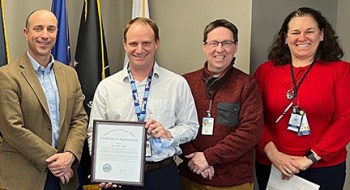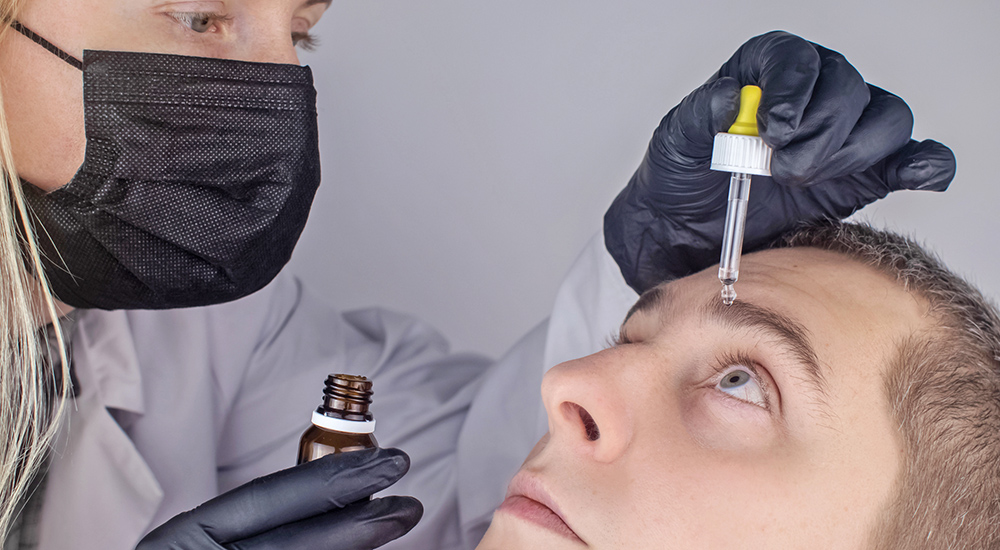When pharmacist Kyle Filby noticed a cost saving difference in dosage bottles for eye drop medication, he let his supervisors at Oklahoma City VA know the initial estimate for this change could save VA about $3.5 million.
Asking the question and finding the answer earned Filby recognition as a VA National High Reliability Organization HeRO.
“Cost efficiency is a large component of my role within the Oklahoma City VA Pharmacy,” said Filby, program manager and pharmacoeconomist. “I asked the question, is there a more efficient way? Comparing several products and packaging, I realized this product was about 40 percent lower per unit.”
How we could improve the process
The medication in question was cyclosporine ophthalmic emulsion or, in layman’s terms, medicated eyedrops. A typical prescription was a 30-dose bottle for once-a-day treatments or two 30-dose bottles for twice-day treatment.

Kyle Filby (with certificate) and (left to right) Oklahoma City VA Director Wade Vlosich, Chief of Pharmacy Services Chris Gentry and Chief of Staff Susan Bray-Hall.
Filby noticed that a 60-dose bottle cost about 40 percent less than two 30-dose bottles.
“This led me to question of how we could improve the process. I reached out within our region as well as national to request a review,” he said.
This led to a change in procedures, saving VA about $3.5 million.
“Our pharmacy leadership strives to be open. We encourage team members to make a difference and feel empowered to bring change,” said Filby. “Don’t be afraid to take the steps to ask the questions and seek out the answers.”
Working hard to improve safety of Veterans’ drugs
“Our pharmacists and technicians work hard to constantly improve the safety and effectiveness of the drug therapies that we provide to our Veterans,” said Chief of Pharmacy Services Chris Gentry. “It’s always rewarding when our efforts are recognized and applauded. High Reliability Organization (HRO) concepts have been repeatedly emphasized to our staff and has become an integral part of our culture.”
Gentry developed the facility’s highly successful Antimicrobial Stewardship Program.
HROs experience fewer than anticipated accidents or events of harm despite operating in highly complex, high-risk environments where even small errors can lead to tragic results.
HROs avoid harm by becoming proficient in three pillars of High Reliability (leadership commitment, culture of safety, and continuous process improvement) while ensuring their staff members adhere to the VA foundation of high reliability principles and values.
We support employees to be honest and accountable
“At Oklahoma City VA, we engage our leadership and employees to create and sustain a safety culture, one in which employees actively report safety concerns or other issues, without fear of reprisal or punitive action,” said HRO lead Aaron Kabrick. “We want our employees to know this organization supports our employees to be honest, accountable, and report inconsistencies. This is even if the errors are their own errors. The whole organization can learn from failures without fear of reprisal and ultimately improve upon our VA healthcare delivery system.”
It was this support that made Filby confident in reporting this discrepancy. “With this culture, I felt comfortable in presenting my findings both to local supervisors as well as VA as a whole,” he added.
Topics in this story
More Stories
Bob Jesse Award celebrates the achievements of a VA employee and a team or department that exemplifies innovative practices within VA.
The Medical Foster Home program offers Veterans an alternative to nursing homes.
Watch the Under Secretary for Health and a panel of experts discuss VA Health Connect tele-emergency care.







And did Mr. Filby at least get a percentage of the money he saved the VA? Guarantee you he didn’t. That’s how the government works. You save them money and you get a certificate of appreciation (lmao). But try to get them to give you a dollar you’re actually entitled to and let me know how that goes for you. I’m 3+ years into fighting for my service-related disability benefits, and the VA has done nothing but give extremely vague reasons for denying my claim (currently in appeal status, awaiting assignment to a judge for well over a year). Anyway, Mr. Filby, I know hindsight is 20/20, but maybe next time you find a way to save the government significant money, tell ‘em you’ll only show them how to do so if they award you a 20% finders fee. You saved them $3.5 million and got a piece of paper. I’d have given them the chance to save $3.5 million if (and only if) they agreed to remunerate me 20% of what I could save them (in your case, $700k). Or maybe quit your job and get a VA contract to sell them the item for less than what they’re currently paying, and then pocket the difference. The $3.5 million you saved them was due to a savings of 40% that you discovered. So, you save them 20% and then your profit is the other 20% they never knew they could save. And it sounds like the $3.5 million was for one year, but the VA will likely be realizing those savings for many years to come…hmmm…come to think of it, I’d have asked for a cool $1 million, take it or leave it. You probably saved them tens of millions of dollars over the next several years…man, I sure hope they at least provided a frame for that certificate…SMH.
Ask veterans how to save even more money, it might Suprise you. For instance, in our V.A. it uses “contractors” for eyewear. They are without a clue, and only want to “deliver” a product. After that, they could care less about any problems that arise. I tried to return 3 different pairs of glasses, their remarks were, “we’re just contractors” we don’t want the glasses. 3rd year after, I had to “go outside the V.A.” to get eyewear I could actually see with to drive. A problem here? I’d say so, 3 pairs of new glasses “donated to charity” at the expense of V.A. Contractors. That reminds me of a $300 hammer.